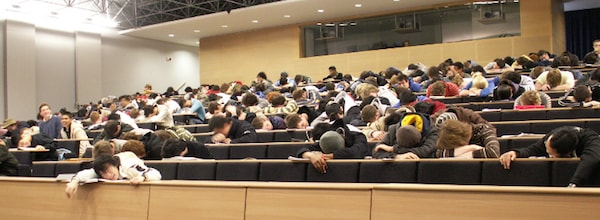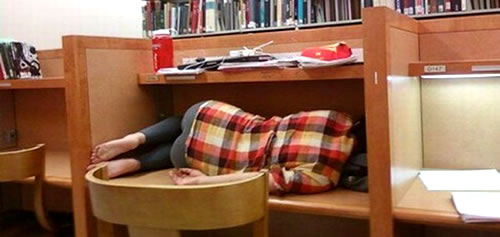New study says 9am lectures should be banned
New research from The Open University suggests 9am lectures for students should be banned - and there's even science behind it.
 Imagine a world where you never had to get out of bed for a 9am lecture again - it’s the stuff dreams are made of!
Imagine a world where you never had to get out of bed for a 9am lecture again - it’s the stuff dreams are made of!
Researchers from The Open University and the University of Nevada have teamed up put forward a case that concludes early morning starts are messing with young people’s body clocks.
Their study claims that early bird lectures should be abandoned completely, and that classes should start no earlier than 11am to allow students to perform to their greatest potential.
Study habits of around 200+ students were examined, and researchers found that academic performance was actually at its best between the hours of 11am and 9.30pm.
The science behind the theory
 Apart from it being incredibly annoying to get up for 9am lectures, researchers have said there's science to support the claim that you shouldn't have to.
Apart from it being incredibly annoying to get up for 9am lectures, researchers have said there's science to support the claim that you shouldn't have to.
During puberty, young people experience biological changes that cause a shift in the body's natural wake-and-sleep times which can move everything as much as three hours later in the day! Apparently, you notice the effects of this most around the age of 19.
The result of this shift is that young people often struggle to learn at a time which feels ‘unnatural’ to them.
On a more serious note, the study also claims that the stress of getting up early and going to class when you're not on your best form could also be contributing to the rise in mental health issues among students in recent years.
The researchers say:
Students do better if they can target their study time to align with their personal rhythm and at the time of day when they know they are most effective.
The temporal misalignment between the sleep timing shift and educational institutions’ usual hours causes significant sleep loss.
Sleep loss, in turn, impairs academic performance and also elevates risks of obesity, depression, and drug abuse.
Is cancelling morning lectures the solution?
 Researchers from Surrey Uni and Harvard Med School argue that delaying start times would only cause most students' internal clocks to drift later on. As a result, they claim students would find it just as hard to get out of bed in a matter of a few weeks. 11pm lecture, anyone?
Researchers from Surrey Uni and Harvard Med School argue that delaying start times would only cause most students' internal clocks to drift later on. As a result, they claim students would find it just as hard to get out of bed in a matter of a few weeks. 11pm lecture, anyone?
As an alternative, they suggested students should ‘re-adjust’ their biological clocks to cope with early starts - by avoiding light given off by smartphones and laptops at night.
However, back in 2009 a school in North Tyneside experimented with delaying start times, beginning the school day at 10am instead of 8.50am.
This saw a notable increase in student achievement at school - particularly amongst disadvantaged students, who saw an increase in those getting five good GCSEs from 19% to 43%. You can't argue with that, can you!
Getting a good night's sleep is just one step in the road to becoming super productive - here's a few other things you can do to start getting things done.








